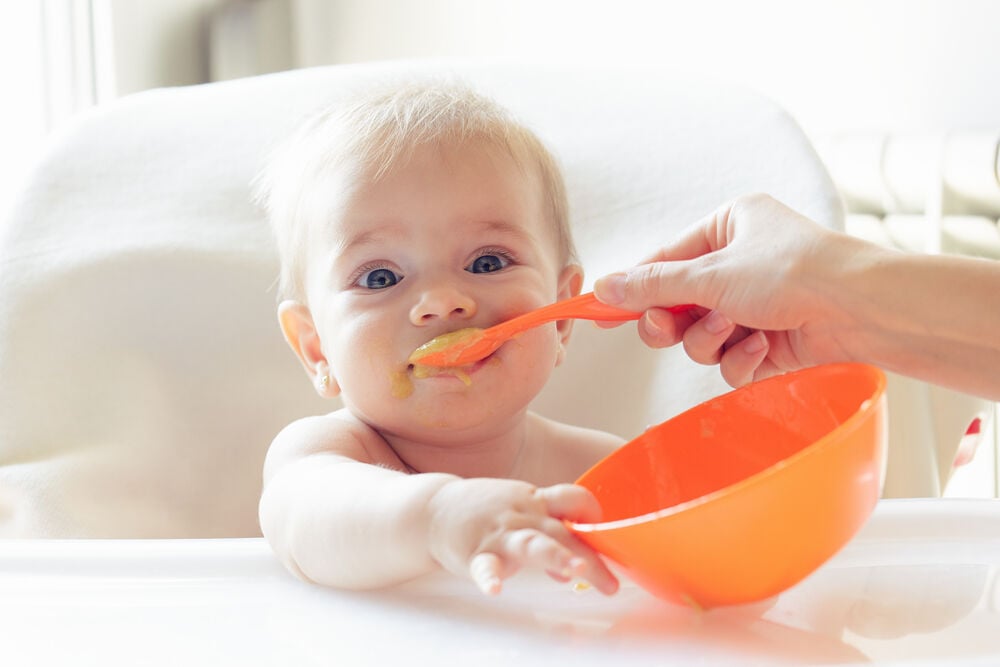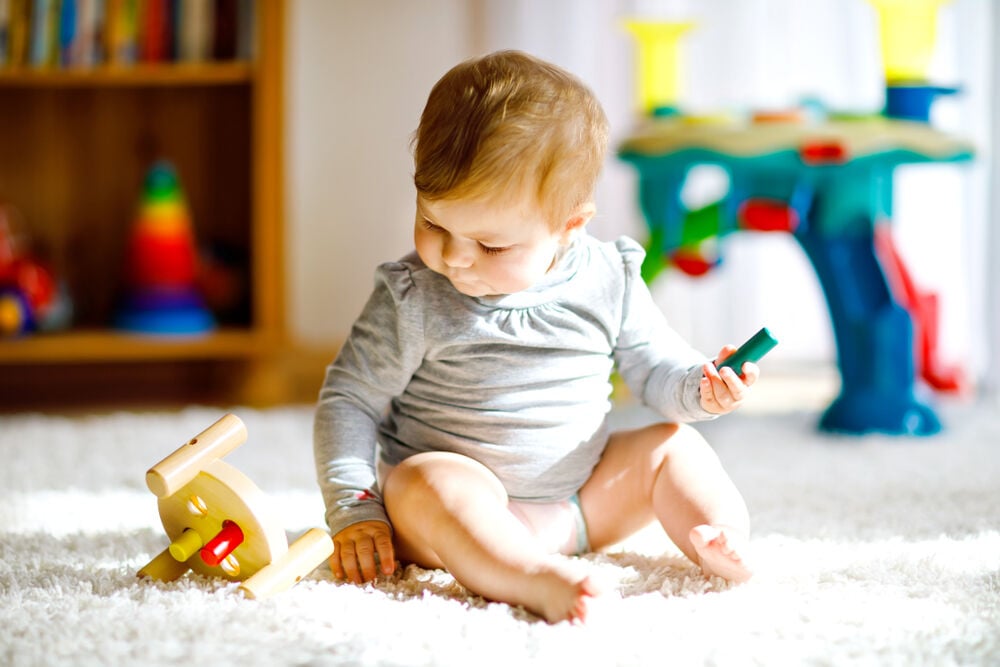It’s been just over half a year since your bundle of joy arrived, but look how big they’ve already grown! Read on as Flo reveals the eight most important milestones in your 7-month-old’s life.
-
Tracking cycle
-
Getting pregnant
-
Pregnancy
-
Help Center
-
Flo for Partners
-
Anonymous Mode
-
Flo app reviews
-
Flo Premium New
-
Secret Chats New
-
Symptom Checker New
-
Your cycle
-
Health 360°
-
Getting pregnant
-
Pregnancy
-
Being a mom
-
LGBTQ+
-
Quizzes
-
Ovulation calculator
-
hCG calculator
-
Pregnancy test calculator
-
Menstrual cycle calculator
-
Period calculator
-
Implantation calculator
-
Pregnancy weeks to months calculator
-
Pregnancy due date calculator
-
IVF and FET due date calculator
-
Due date calculator by ultrasound
-
Medical Affairs
-
Science & Research
-
Pass It On Project New
-
Privacy Portal
-
Press Center
-
Flo Accuracy
-
Careers
-
Contact Us
Key Milestones for Your 7-Month-Old Baby


Every piece of content at Flo Health adheres to the highest editorial standards for language, style, and medical accuracy. To learn what we do to deliver the best health and lifestyle insights to you, check out our content review principles.
How big should my 7-month-old be?
How much should a 7-month-old baby weigh? How tall should they be? The average weight at this age is 16.8 pounds for girls and 18.3 pounds for boys. Meanwhile, the average height or length is 26.5 inches for girls and 27.2 inches for boys.
7-month-old baby milestones
In this phase of life, your child’s physical and mental capabilities are progressing at a rapid rate. But how do you know if they’re hitting the right milestones at the right times? Next, we discuss the crucial signs you should be looking out for.
1. Teething
Tiny tooth buds will pop up between the ages of 5 and 7 months, and your baby will salivate a lot more. Provide a baby teether or damp washcloth to chew on for a little relief from gum discomfort and irritability.
The two lower middle teeth (lower central incisors) emerge first, at roughly 6 to 10 months. They’re followed by the two upper middle teeth (upper central incisors), at around 8 to 12 months. Surrounding teeth should fill in over the course of the next few months, but don’t be alarmed if it takes longer. It’s not uncommon for some children to show no teeth at all until after their first birthday.
As soon as you spot their first teeth, practice good dental hygiene for your baby. Help them brush daily with an extra soft toothbrush and a tiny dab of baby-safe toothpaste.
2. Nonverbal communication
Though it’s far too early for talking, you may notice your baby turning their head whenever they hear their name called. They might also understand what the word “no” means now, regardless of whether they actually obey it.
Your child’s already learning to master nonverbal communication, as shown by facial expressions, such as grinning, frowning, and everything in between. They can even pick up cues on how you’re feeling based on your body language and the tone of your voice.
3. Babbling
Now’s the time to appreciate all the sounds your little one likes to make. At the 1-month mark, your baby responds to noises, then begins vocalizing at 2 months. Laughing starts around 4 months of age, while babbling occurs a couple months after that. By the time they reach 9 months, your child may be trying to say “mama,” “dada,” or “bye-bye”!
4. Eating solid foods

Mealtimes are pretty exciting for your 7-month-old, especially now that they’re graduating to solid foods. Watch out for certain signs that they’re ready to make the transition. They include better hand-to-mouth coordination, decreased tongue protrusion reflex, being able to sit up well, and opening their mouth for the spoon.
Consider adding a wide range of mashed fruits and vegetables to their diet. By offering increasingly thicker foods, you’ll be exposing your baby to new textures which help them practice chewing. Taste-wise, it’s best to work your way from bland to sweeter or saltier.
Always remain wary, however, of potential allergies. New foods should be introduced individually, and at least a week apart, so you can clearly identify what they can or can’t handle. Diarrhea, vomiting, skin rashes, or wheezing are all red flags.
Lastly, remember to stay away from foods which pose a choking hazard, including small fruits, raw vegetables, nuts, candy or gum. Children under five years old should never consume grapes or similarly shaped items unless they’ve been halved or quartered.
5. Movement
When it comes to movement, you may see your baby rolling, sitting unsupported, switching hands while holding objects, and much more. However, don’t expect them to hit all their milestones at the exact same time as other children or even older siblings. Each child’s motor skills tend to evolve in a unique way.
A 7-month-old baby will likely be strong enough to stand up with a bit of support. You can help prepare them for walking by encouraging them to practice both indoors and out.
6. Sensory development
With each passing month, your child’s ability to sense things is quickly improving. At just 1 month, they’ll react to pain or any noises they hear, and perhaps even establish eye contact. On the other hand, a 7-month-old recognizes the difference between you or your partner versus a stranger, and might occasionally reward you with a social smile. They also perceive the full spectrum of colors now and their distance vision has matured.
7. Sleep patterns
As you’re well aware, sleep is a very important part of your little one’s life. For optimal health, they should be sleeping for a combined total of 12 to 16 hours a day, including two to three naps. Habits still vary widely as some 7-month-old babies nap for a few hours at a time, and others for 30 minutes or less.
8. Motor skills

Take a quiz
Find out what you can do with our Health Assistant
Has your child been picking up toys and other small items? Can they sit well unsupported and roll from face down to face up? Are they now able to hold forks, spoons, and sippy cups? These are all milestones to be proud of!
Reinforce your baby’s evolving motor skills by positioning toys slightly out of reach so they have something to aim for as they wander. Just remember to move any dangerous items out of the immediate area.
I got Flo last year in hopes of getting pregnant again after 15 years and me being 37. I entered my stuff in and it told me when I was most fertile! And after just 2 months of using this app, I was pregnant! I now have a healthy baby girl and using the app again to try for another baby! Get the app if you want to get pregnant!
Tips and safety precautions
As the above 7-month-old baby milestones come and go, keep the following things in mind.
- Eating: Once they’ve switched to solid foods, it’s the perfect time to welcome them to the family dinner table. Pull up their high chair and encourage them to socialize with others.
- Playing: Simple games and activities with loved ones are critical for your baby’s ongoing development. Expensive equipment and trendy toys aren’t necessary for playtime – instead, teach them a few of your own childhood favorites.
- Walking: Your little one will be up and about before you know it, and there’s absolutely no need to use a baby walker. In fact, recent statistics show an average of 9,000 children are injured in baby walkers across the U.S. every single year. This is due, in large part, to stair-related falls and the fact that they suddenly put hard-to-reach areas right in your baby’s path. As a result, the American Academy of Pediatrics strongly urges parents not to use baby walkers.
- Baby-proofing: As your child becomes increasingly mobile, you’ll have to begin making a lot of adjustments around the house. One of the easiest ways to do this is by getting on the floor and checking for any hazards they may encounter while exploring.


Hey, I'm Anique
I started using Flo app to track my period and ovulation because we wanted to have a baby.


The Flo app helped me learn about my body and spot ovulation signs during our conception journey.


I vividly
remember the day
that we switched
Flo into
Pregnancy Mode — it was
such a special
moment.
Real stories, real results
Learn how the Flo app became an amazing cheerleader for us on our conception journey.




